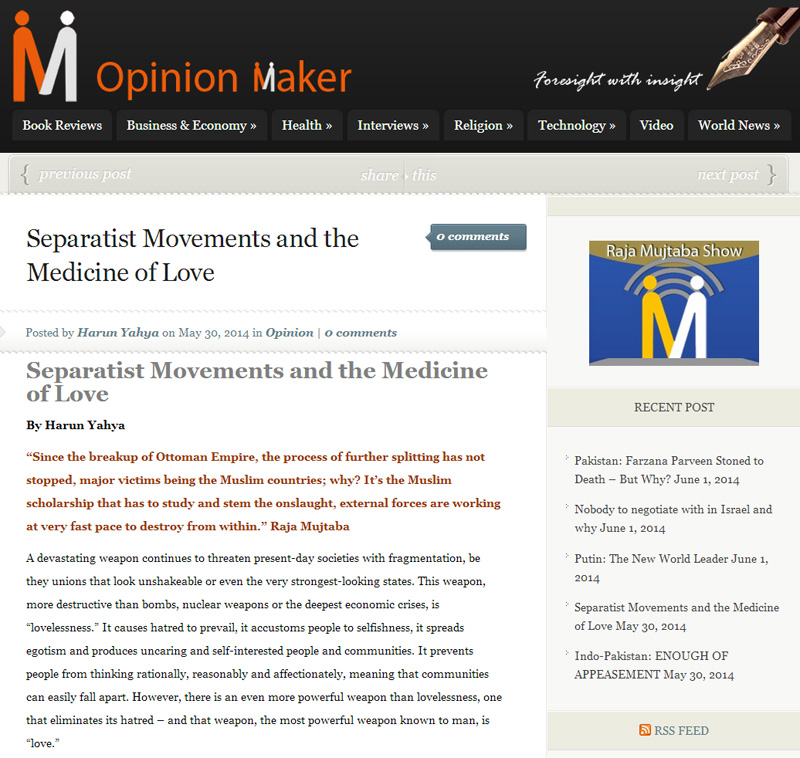
"Since the breakup of Ottoman Empire, the process of further splitting has not stopped, major victims being the Muslim countries; why? It’s the Muslim scholarship that has to study and stem the onslaught, external forces are working at very fast pace to destroy from within." Raja Mujtaba
A devastating weapon continues to threaten present-day societies with fragmentation, be they unions that look unshakeable or even the very strongest-looking states. This weapon, more destructive than bombs, nuclear weapons or the deepest economic crises, is “lovelessness.” It causes hatred to prevail, it accustoms people to selfishness, it spreads egotism and produces uncaring and self-interested people and communities. It prevents people from thinking rationally, reasonably and affectionately, meaning that communities can easily fall apart. However, there is an even more powerful weapon than lovelessness, one that eliminates its hatred – and that weapon, the most powerful weapon known to man, is “love.”
The World Is Being Rocked by Divisions
Iraq, Yemen and Sudan have been split up. Crimea has seceded from Ukraine and Donetsk is most likely next in line. Moldova’s Trans-Dniester region has also decided to break away. Syria is effectively broken up, de facto if not officially. Libya is divided into autonomous regions and is on the brink of outright civil war. Scotland wants independence. Autonomous regions in Spain and Italy want to declare independence. Lebanon has lost its territorial integrity. Mass executions are on the way in Egypt.
In addition to two world wars, the last century also witnessed communities that had lived together for centuries dividing and polarizing.
Will Spain Break Apart?
Spain suffered through a civil war in 1936-1939 and after that war, a repressive, ruthless and loveless regime assumed power. Democracy was suspended during Generalissimo Francisco Franco’s fascist dictatorship. Franco died in 1975 and elections were held in 1977; a new Constitution was passed in 1978 and Spain was divided into 17 autonomous communities and two autonomous cities. From that time on, Spanish governments have wiped away all traces of the previous repressive regime, done away with discrimination and defended freedoms.[1]
Spain today is a member of the EU. It is accepted by all as a country enjoying an advanced democracy. There are two great problems now facing Spain: The first is the economic crisis, which has brought the country to the edge of bankruptcy, and unemployment levels of around 25%. The second is the attitude of the autonomous Basque Country and Catalonia, both of which wish to break away entirely. The Basque Country and Catalonia are the wealthiest regions of the country. They are dependent on the central authority only in terms of defense, social security and financial policies, but they still want to separate.
It is of course very troubling for bodies that lived together as one for centuries, share a common culture and together constitute a powerful Spain to wish to separate during an economic crisis.[2] It cannot be regarded as acceptable to anyone to proffer separatist ideas based on extreme nationalism when the country is facing difficult times and to endanger the whole country out of mere self-interest and egotism.
The problem of the Basque region began with opposition to the central authority’s refusal to recognize autonomous structures in the 19th Century. The ETA (Euskadi Ta Askatasuna, or 'Basque Homeland and Freedom') terrorist organization, which began making a rather infamous name for itself as far back as 1959, caused the loss of some 850 lives by the time it announced it was laying down its weapons in 2011.[3] ETA and its political wing, Batasuna, supported the demand for independence. (Batasuna was outlawed in 2003, and announced its self-dissolution in 2013.[4]) However, it can be seen from the way that ETA stepped up its terror campaign after 1978 that autonomy is not its only demand, and that it really wants full independence. ETA has persisted in acts of terrorism, even after the Basque region achieved autonomy in 1978 and despotic state policies were done away with.[1] http://en.wikipedia.org/wiki/Spain
[2] http://www.euronews.com/2012/10/22/basques-and-catalans-eye-chance-in-crisis/
[3] http://www.euronews.com/2011/10/21/eta-finally-accepts-nunca-mas/
[4] http://en.wikipedia.org/wiki/Batasuna
Adnan Oktar's piece on Opinion Maker:


